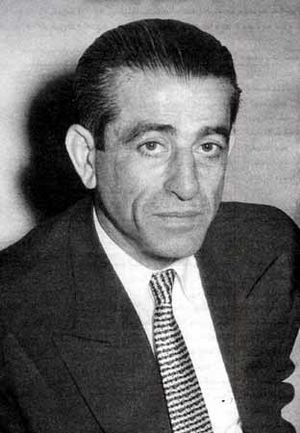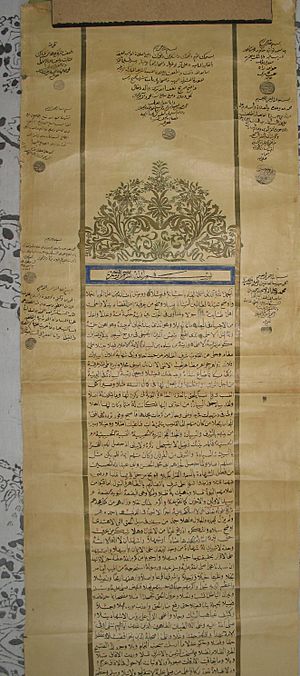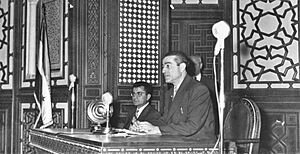Akram al-Hawrani facts for kids
Quick facts for kids
Akram Al-Hourani
أَكْرَم الْحَوْرَانِي |
|
|---|---|
 |
|
| Vice President of the United Arab Republic | |
| In office 7 March 1958 – 19 September 1960 |
|
| President of the Chamber of Deputies | |
| In office 14 October 1957 – 20 July 1960 |
|
| Preceded by | Nazim al-Kudsi |
| Succeeded by | Anwar Sadat |
| Member of the People's Council for Hama |
|
| In office July 1947 – October 1953 |
|
| In office November 1954 – 1963 |
|
| Member of the National Command of the Arab Socialist Ba'ath Party | |
| In office 1952 – 1 September 1959 |
|
| Minister of Defence | |
| In office 28 December 1949 – 4 June 1950 |
|
| President | Hashim al-Atassi |
| Prime Minister | Khalid al-Azm |
| Preceded by | Abdullah Atfeh |
| Succeeded by | Fawzi Selu |
| Personal details | |
| Born | 4 November 1911 Hama, Ottoman Syria |
| Died | 24 February 1996 (aged 84) Amman, Jordan |
| Political party | Arab Socialist Party (1936–52) Syrian Regional Branch of the Arab Socialist Ba'ath Party(1952–62) Arab Socialist Party (1962–63) |
| Spouse | Naziha Al-Houmsi |
Akram Al-Hourani (Arabic: أَكْرَم الْحَوْرَانِي, romanized: ʾAkram al-Ḥawrānī) was an important Syrian politician. He lived from November 1911 to February 1996. He played a big part in Syria's government during the 1950s.
Al-Hourani started and led a group called the Arab Socialist Party. He was very important in Syrian politics from the 1940s until he left the country in 1963. During this time, he helped make many changes to create a fairer society. He especially worked on sharing land more equally, moving away from an old system where a few rich families owned most of the land.
He held many important jobs. He was a member of the Syrian parliament, the head of the parliament, and even a minister (like a government leader) for agriculture and defense. He also served as the vice-president of the United Arab Republic. His grandson, also named Akram Al-Hourani, is a university lecturer in Australia.
Contents
Who Was Akram Al-Hourani?

Akram Al-Hourani's family came from an Arab tribe called al-Halqiyyin. They moved to Hama in central Syria from a town called Jasim. This town was in the southern Hawran region, which is why their family name is Al-Hourani. Some records show that his family might be related to the prophet Muhammad.
Akram Al-Hourani was born in Hama. His family was not very rich. He went to school in Hama and Damascus. His father, Muhammad Rasheed Al-Hourani, was a merchant who bought farm lands. He knew Arabic and Turkish and had many books. Akram's father died when Akram was only four years old. This happened in 1915, during World War I, when he was helping people in Hama.
In 1936, Akram Al-Hourani started studying law in Damascus. He joined a political group, but he later left it in 1938. He went back to Hama to work as a lawyer. There, he took over a group called Hizb al-Shabab (Youth Party). This group later became the Arab Socialist Party.
Fighting for Fairness
In the early 1900s, the area of Hama had a system called feudalism. This meant that a few very rich landlords owned almost all the land. These landlords had complete power over the farmers who worked their land. They even had their own private guards to enforce their rules.
Akram Al-Hourani strongly disagreed with this system. He wanted to change how land was owned and shared. He called for "agrarian reforms," which meant giving land to the farmers. Many people in Hama and its surrounding areas supported him because of this.
In 1943, he was elected to the Syrian Parliament. He kept his seat in elections in 1947, 1949, 1954, and 1962. While he became known for fighting for fairness in his home region, he also believed strongly in Arab nationalism. This is the idea that Arab countries should be united.
Becoming More Powerful
In 1950, Al-Hourani changed his party's name to the Arab Socialist Party. At that time, it had many members, about 10,000 people. It could even bring together 40,000 farmers for meetings. In the same year, his party held the first meeting for farmers in Syrian history in Aleppo.
Between 1949 and 1954, Syria had four military coups. A coup is when the military takes control of the government by force. Some people thought Al-Hourani was involved in these coups because he had strong connections in the army. However, there is no clear proof that he was involved.
He was close to Adib al-Shishakli, who led two of these coups and ruled Syria from 1951 to 1954. In 1952, Al-Shishakli decided to give government lands to farmers. This decision seems to have been influenced by Al-Hourani. But as Al-Shishakli became more controlling, Al-Hourani's influence decreased.
When Al-Shishakli banned the Arab Socialist Party in April 1952, Al-Hourani had to leave Syria and go to Lebanon. In November of that year, he agreed to join his Arab Socialist Party with the Arab Ba'ath Party. This party was led by Michel Aflaq and Salah al-Din al-Bitar. By joining, the Ba'ath Party gained many new supporters. The new combined party was called the Arab Ba'ath Socialist Party.
Later, in 1958, this party and all other Syrian political parties were shut down by President Nasser. Al-Hourani and Aflaq had a difficult relationship that ended badly in 1962. Al-Hourani did not support military coups to gain power. For example, he was against a plan by some army officers in 1957 to take over the government.
The Arab Ba'ath Socialist Party
Al-Hourani was a member of the Ba'ath Party's main leadership, called the national command. He was part of it from when it started in 1954 until 1959. He and other Ba'ath Party members helped lead protests that made Al-Shishakli leave power in early 1954.
Al-Hourani was the speaker of the Syrian parliament from 1957 to February 1958. As speaker, he helped bring in new social and economic changes that were helpful for many people.
The United Arab Republic
In 1958, Syria and Egypt joined together to form the United Arab Republic (UAR). Al-Hourani became the vice-president of the UAR under Gamal Abdel Nasser. He held this job until 1959.
Nasser later criticized the Ba'ath Party and took action against its members. Because of this, Al-Hourani resigned from his position and went to Lebanon. He then disagreed with Aflaq and al-Bitar about the UAR. Al-Hourani wanted Syria to leave the UAR.
In 1961, a military coup in Syria led to the UAR breaking apart. Al-Hourani publicly supported this and signed a statement agreeing with Syria leaving the UAR. The Ba'ath Party then split into different groups. Since the main Ba'ath leadership wanted to reunite with Egypt, Al-Hourani left the party.
He was officially removed from the party in June 1962. After that, he and his supporters started the Arab Socialist Party again. However, many people still wanted Syria and Egypt to be united, so his party did not grow much. It was only strong in his home area of Hama. In September 1962, he joined a new government that supported Syria's separation from the UAR. This made many Ba'athist and Nasserist groups criticize him.
In 1963, another military coup brought the Ba'ath Party to power. Al-Hourani was arrested and put in prison. He was then sent out of Syria. He spent his last years in Amman, Jordan, where he passed away in 1996.
Sources
- Batatu, Hanna, The Old Social Classes and New Revolutionary Movements in Iraq, Saqi Books, London, 2000
- Seale, Patrick, Asad: the struggle for the Middle East, California University Press, Berkeley, 1990. ISBN: 0-520-06976-5
- Mufti, Malik, Sovereign Creations: Pan-Arabism and Political Order in Syria and Iraq, Cornell University Press: Ithaca, 1996. ISBN: 0-8014-3168-9
- "Akram al-Hawrani", from the Syrian Encyclopedia
- Al-Hournai, Akram, "Akram Al-Hourani Memoirs", Madbouly Bookshop, 2000
See also
 In Spanish: Akram al-Hawrani para niños
In Spanish: Akram al-Hawrani para niños
 | Shirley Ann Jackson |
 | Garett Morgan |
 | J. Ernest Wilkins Jr. |
 | Elijah McCoy |



